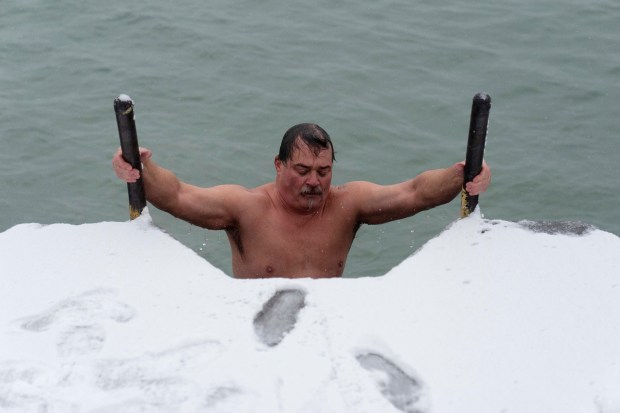By LINDSEY TANNER | AP Medical Writer
The coolest thing on social media these days may be celebrities and regular folks plunging into frigid water or taking ice baths.
The touted benefits include improved mood, more energy, weight loss and reduced inflammation, but the science supporting some of those claims is lukewarm.
Kim Kardashian posted her foray on Instagram. Harry Styles has tweeted about his dips. Kristen Bell says her plunges are “brutal” but mentally uplifting. And Lizzo claims ice plunges reduce inflammation and make her body feel better.
Here’s what medical evidence, experts and fans say about the practice, which dates back centuries.
THE MIND
You might call Dan O’Conor an amateur authority on cold water immersion. Since June 2020, the 55-year-old Chicago man has plunged into Lake Michigan almost daily, including on frigid winter mornings when he has to shovel through the ice.
“The endorphin rush … is an incredible way to wake up and just kind of shock the body and get the engine going,” O’Conor said on a recent morning when the air temperature was a frosty 23 degrees (minus-5 Celsius). Endorphins are “feel good” hormones released in response to pain, stress, exercise and other activities.
With the lake temperature 34 degrees (1 Celsius), the bare-chested O’Conor did a running jump from the snow-covered shore to launch a forward flip into the icy gray water.

His first plunge came early in the pandemic, when he went on a bourbon bender and his annoyed wife told him to “go jump in the lake.” The water felt good that June day. The world was in a coronavirus funk, O’Conor says, and that made him want to continue. As the water grew colder with the seasons, the psychological effect was even greater, he said.
“My mental health is a lot stronger, a lot brighter. I found some Zen down here coming down and jumping into the lake and shocking that body,” O’Conor said.
Dr. Will Cronenwett, chief of psychiatry at Northwestern…
Read the full article here







